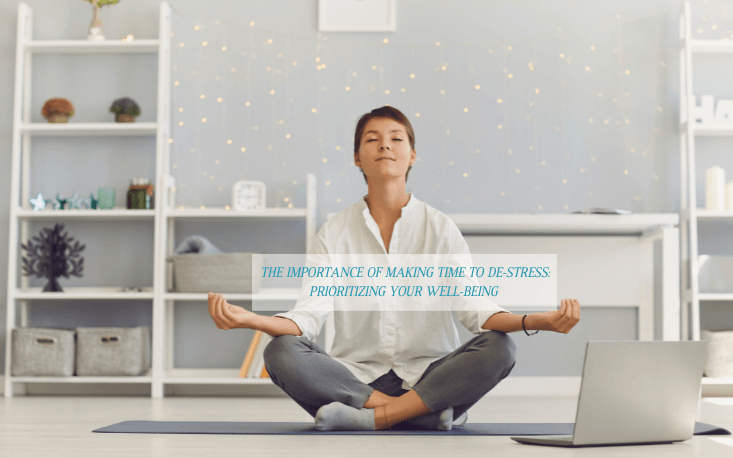In the hustle and bustle of modern life, it’s easy to get caught up in the never-ending cycle of work, obligations, and responsibilities. With packed schedules and constant connectivity, it’s no wonder that stress has become a prevalent issue for many people. However, amidst the chaos, it’s crucial to remember the importance of carving out time to destress. Taking time for yourself isn’t just a luxury; it’s a necessity for maintaining your overall well-being. In this blog post, we’ll explore the numerous benefits of making time to destress and how it can positively impact your life.
- Reduced Stress Levels: Perhaps the most obvious benefit of de-stressing is the reduction of stress levels. Chronic stress can take a toll on both your physical and mental health, leading to a variety of ailments such as high blood pressure, anxiety, and depression. By engaging in activities that help you relax and unwind, you can lower your stress hormones and promote a sense of calmness and relaxation.
- Improved Mental Health: Taking time to destress can significantly improve your mental health. Activities such as meditation, mindfulness, or simply spending time in nature can help clear your mind, reduce negative thought patterns, and promote a greater sense of clarity and focus. Additionally, regular relaxation practices have been shown to alleviate symptoms of anxiety and depression, improving overall mood and emotional well-being.
- Enhanced Productivity and Creativity: Contrary to popular belief, taking breaks and engaging in leisure activities can actually boost productivity and creativity. When you’re constantly under stress and pressure, your cognitive abilities become compromised, making it difficult to concentrate and think creatively. By allowing yourself time to destress, you give your brain the opportunity to recharge and rejuvenate, leading to improved cognitive function and enhanced problem-solving skills.
- Better Physical Health: The benefits of destressing extend beyond mental well-being and can also have a positive impact on your physical health. Chronic stress has been linked to numerous health problems, including heart disease, obesity, and digestive issues. By incorporating relaxation techniques into your routine, you can lower your risk of developing these conditions and improve overall physical health.
- Stronger Relationships: Stress can often take a toll on relationships, leading to increased conflict and tension. By prioritizing de-stressing activities, you not only improve your own well-being but also strengthen your relationships with others. Whether it’s spending quality time with loved ones or simply taking a break to connect with friends, fostering supportive relationships can provide a valuable source of comfort and relaxation.
- Increased Resilience: Life is full of ups and downs, and learning how to effectively manage stress is essential for building resilience. By regularly practicing de-stressing techniques, you develop coping mechanisms that enable you to better navigate life’s challenges and setbacks. Instead of feeling overwhelmed and defeated, you’ll be better equipped to bounce back and persevere in the face of adversity.
In conclusion, making time to destress is not just a luxury but a vital component of maintaining overall well-being. By prioritizing relaxation and self-care, you can reduce stress levels, improve mental and physical health, enhance productivity and creativity, strengthen relationships, and build resilience. So, whether it’s through meditation, exercise, or simply indulging in your favorite hobbies, be sure to carve out time for yourself each day to unwind and recharge. Your mind, body, and spirit will thank you for it.

